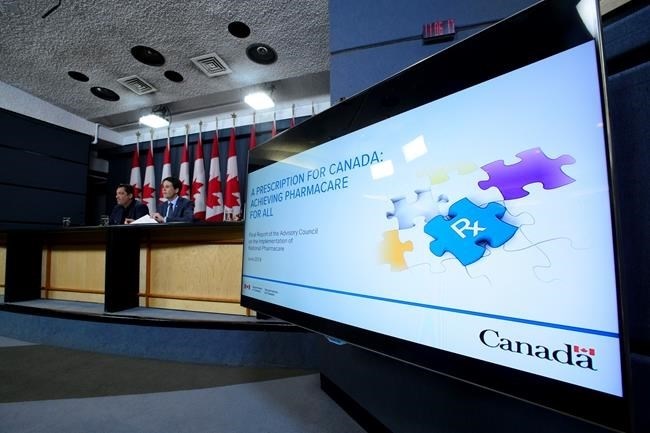
Image Credit: Shutterstock
June 12, 2019 - 10:31 AM
OTTAWA - An expert panel is calling for the federal government to work with the provinces and territories to create a single-payer pharmacare plan to cover every Canadian.
Eric Hoskins, Ontario's former health minister, released the findings in Ottawa, giving advice on how to address the country's patchwork of private and public prescription-drug plans.
Canada has a variety of drug plans administered by provinces, mainly for children, seniors and people on social assistance. Other plans managed by the federal government cover other groups, such as Indigenous people and members of the military, while private insurance fills the gaps for some.
Hoskins' council is recommending a new drug agency that would be responsible for developing a national list of prescription drugs, known as a formulary, beginning with common or so-called essential medicines by Jan. 1, 2022.
It also recommends that the initial formulary expand to a "fully comprehensive formulary" no later than Jan. 1, 2027.
Health Minister Ginette Petitpas Taylor responded with a statement saying the government "will carefully review the council's final report and its recommendations" and to work with provinces, territories, stakeholders and partners "as we consider next steps."
READ MORE: Highlights from expert panel report on national pharmacare plan

Dr. Eric Hoskins, Chair of the Advisory Council on the Implementation of National Pharmacare, is accompanied by Vincent Dumez, Member of the Advisory Council on the Implementation of National Pharmacare, during a press conference at the National Press Theatre in Ottawa on Wednesday, June 12, 2019.
Image Credit: THE CANADIAN PRESS/Sean Kilpatrick
"Our council has heard the stories of thousands of Canadians and listened to a wide range of perspectives," Hoskins said in the report, entitled "A Prescription for Canada: Achieving Pharmacare for All."
"The time for universal, single-payer, public pharmacare has come ... Let's complete the unfinished business of universal health care. That can be our promise, and our legacy, to each other and to all future generations."
The council says universal, single-payer public pharmacare will provide access to prescription medications for all Canadians, including an estimated one in five Canadians who are either uninsured or underinsured.
"Despite everyone's best efforts, the (current) system is fragmented, uneven, unequal and unfair," the report says.
"The result is a non-system where too many people fall through the cracks. Not only does this lead to ill health, it also costs the health system billions of dollars in extra visits to physicians and hospitals when people’s health fails as a result of lack of access to medicines.".
The report also calls for the federal government work with the provincial and territorial governments to begin to implement national pharmacare as soon as possible, with a new financing agreement to be developed jointly by governments and with Ottawa paying the incremental costs.
Canadians spent $34 billion on prescription medicines in 2018, the report says, adding drugs are the second-biggest expenditure in health care after hospitals.
"We spend even more on drugs than on doctors," it says.
"On a per capita basis, only the United States and Switzerland pay more for prescription drugs. Yet for all that spending, there are huge gaps in coverage."
The report recommends that payments for individuals be limited to $2 per prescription for essential medicines and $5 per prescription for all other drugs on the national formulary, with an annual limit of $100 per household.
It says those living with disabilities, people on social assistance and low-income seniors should be exempt from these fees, known as co-payments.
The plan, once implemented, will result in an estimated $5 billion in savings, the council said Wednesday, adding that savings for Canadians will be on average $350 per year.
In its last budget, the Liberal government pledged to create a new agency to buy drugs in bulk and cut Canadian medication costs as the first step toward a national drug plan.
The government also promised to spend $500 million a year, starting in 2022, on subsidizing drugs that treat rare diseases, which have few patients to split huge research and development costs.
It also said it intends to work with provinces, territories and other partners to develop the mandate for the national drug agency, with Health Canada to receive $35 million over four years starting in 2019-2020 to create an office to support the plan.
—Follow @kkirkup on Twitter
News from © The Canadian Press, 2019